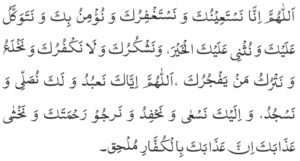There are four types of Prayers:
-
Fard
-
Wajib
-
Sunnat
-
Nafl
Fard Prayers
Fard is an Arabic word which means compulsory or obligatory. There are five obligatory Prayers everyday:
|
Prayer
|
No. of Rak’at
|
|
Fajr
|
2
|
|
Zuhr
|
4
|
|
‘Asr
|
4
|
|
Maghrib
|
3
|
|
‘Isha’
|
4
|
It is sinful to leave out a Fard Prayer intentionally, but if such a Prayer is missed through forgetfulness or due to unavoidable circumstances, then this mistake can be rectified by offering the missed Prayer as soon as one remembers, or whenever possible.
Wajib Prayers
The following Prayers are regarded as Wajib (necessary) Prayers:
-
Three Rak‘at of Vitr.
-
Two Rak‘at of ‘Idul-Fitr and two Rak‘at of ‘Idul-Adha.
-
Two Rak‘at offered while performing the Tawaf of the Ka‘bah.
If a person misses these Prayers intentionally, he is deemed to have committed a sin. However, if he misses a Wajib Prayer unintentionally, e.g., through forgetfulness, he is not required to offer it as a Qada Prayer. Qada means offering of a missed Prayer.
Salatul-Vitr
Vitr literally means odd. There are three Rak‘at in this Prayer. It is offered after the ‘Isha’ Prayer. It is preferable to recite Surah Al-A‘la, Surah Al-Kafirun and Surah Al-Ikhlas respectively in these Rak‘at. However, this is not necessary. Any Surah or verses of the Holy Quran can be recited. In the third Rak‘at of Vitr, after performing the Ruku‘, Du‘a’i Qunut should be recited which is as follows:

Transliteration:
Allahumma inna nasta‘inuka wa nastaghfiruka, wa nu‘minu bika wa natawakkalu ‘alaika, wa nuthni ‘alaikal khair, wa nash-kuruka wala nakfuruka, wa nakhla‘u wa natruku man-yafjuruk. Allahumma iyyaka na‘budu wa laka nusalli wa nasjudu, wa ilaika nas‘a wa nahfidu, wa narju rahmataka, wa nakhsha ‘adhabaka, Inna ‘adhabaka bil kuffari mulhiq.
Translation:
O Allah, we beseech Thy help and ask Thy protection and believe in Thee and trust in Thee and we praise Thee in the best manner and we thank Thee and we are not ungrateful to Thee, and we cast off and forsake him who disobeys Thee. O Allah! Thee alone do we serve and to Thee alone do we pray and make obeisance and to Thee we flee and we are quick and we hope for Thy mercy and we fear Thy chastisement, for surely Thy chastisement overtakes the unbelievers.
Sunnat Prayers
The Holy Prophet(sa) of Islam offered extra Rak‘at of Prayer in addition to those of Fard Prayers. These Prayers are called Sunnat Prayers. Offering Sunnat Prayers is considered to be necessary by all jurists. The wilful neglect of Sunnat Prayers is censurable in the sight of Allah. Sunnat Prayers are:
-
Two Rak‘at before the Fard Prayer of Fajr; but if a person joins the congregation without having offered two Rak‘at of Sunnat due to some unavoidable circumstances, he can offer them after the congregational lead Prayer.
-
Four Rak‘at before Fard and two Rak‘at after Fard in Zuhr Prayer. In case one has not performed the four Rak‘at of Sunnat before the congregational four Rak‘at due to unavoidable circumstances, one should do so after the congregational Prayer.
Note: Ahmadi Muslims, who most often follow the Hanafi school of thought, offer four Rak‘at of Sunnat before the Fard of Zuhr and two Rak‘at of Sunnat after the Fard of Zuhr Prayer. However, some other Muslims offer four Rak‘at of Sunnat before the Fard of Zuhr Prayer and four after the Fard of Zuhr Prayer.
-
Two Rak‘at of Sunnat after the Fard of Maghrib Prayer.
-
Two Rak‘at of Sunnat after the Fard Rak‘at of ‘Isha’ Prayer.
Nawafil Prayers
Muslims also offer additional Rak‘at of Prayer apart from Fard and Sunnat Rak‘at. These are called Nawafil Prayers or Nafl.
These are optional Prayers. Those who voluntarily offer Nawafil Prayers reap the benefits of Allah’s favours. Nawafil Prayers are as follows:
-
Eight Rak‘at of Tahajjud.
-
Two Rak‘at after the two Rak‘at of Sunnat at the end of Zuhr Prayer.
-
Four Rak‘at before Fard of ‘Asr Prayer.
-
Two Rak‘at after the two Rak‘at of Sunnat in Maghrib Prayer.
-
Four Rak‘at of Ishraq Prayer.
-
Two Rak‘at offered when one enters a mosque.
-
Two Rak‘at offered when seeking blessings from God Almighty.
-
Two Rak‘at offered as Salat-i-Hajjat.
-
Two Rak‘at offered as a Thanksgiving Prayer.
There are some other Nawafil Prayers which are mentioned later in this book.
One may offer as many Nawafil Prayers as one wishes. However, Nawafil should not be offered during the forbidden times for Prayers. For example, they should not be offered between ‘Asr Prayer and Maghrib Prayer. It is preferable to offer Nawafil Prayers at home rather than in a mosque except for those which have been mentioned to be offered in a mosque. However, it is a matter of personal choice and there is no compulsion in this matter.